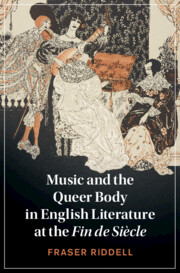Music and the Queer Body in English Literature at the Fin de Siècle
Drawing on an ambitious range of interdisciplinary material, including literature, musical treatises and theoretical texts, Music and the Queer Body explores the central place music held for emergent queer identities in the late nineteenth and early twentieth centuries. Canonical writers such as Walter Pater, E. M. Forster and Virginia Woolf are discussed alongside lesser-known figures such as John Addington Symonds, Vernon Lee and Arthur Symons. Engaging with a number of historical case studies, Fraser Riddell pays particular attention to the significance of embodiment in queer musical subcultures and draws on contemporary queer theory and phenomenology to show how writers associate music with shameful, masochistic and anti-humanist subject positions. Ultimately, this study reveals how literary texts at the fin de siècle invest music with queer agency: to challenge or refuse essentialist identities, to facilitate re-conceptions of embodied subjectivity and to present alternative sensory experiences of space and time. This title is also available as Open Access on Cambridge Core.
Dr Fraser Riddell is Assistant Professor in Literary Medical Humanities at Durham University. Recent publications include articles in Victorian Literature and Culture and the Journal of Victorian Culture, as well as a chapter in the Oxford Handbook of Decadence. He previously taught at Trinity College, Oxford, and the University of St Andrews.

